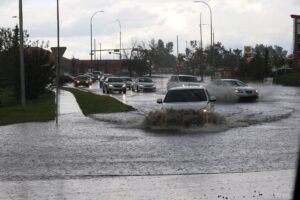WASHINGTON, DC – October 9, 2024 – Unless you live in a cave, everyone in western North Carolina knows that it rained there a lot from September 25 to 27. Afterwards, the French Broad and Swannanoa Rivers flooded roads, homes and businesses causing massive destruction. Our region has not ever had the amount of rain and floods that we encountered since the ‘Great Flood’ of 1916. Hurricane Helene has inflicted more death and destruction on the continental U.S. since Katrina in 2005. So why should anyone prepare for such a catastrophic event that has never occurred before?
I lost my electricity, running water, internet access and cell service. Even the ability to send a text message was iffy. My rechargeable flashlight ran out of charge, so I used battery power flashlights. I had to drive my car around town to recharge my cell phone. I was advised to boil low-pressure water before washing my hands, brushing my teeth, or using it for food preparation. However, I didn’t hear the instructions correctly on the radio and boiled it for one hour not one minute. My wife told me that half the water had evaporated away!
My food and water supplies were dwindling over the course of 4-5 days. I was eating dry cereal for breakfast, a low glycemic energy bar for lunch, and used the grill to eat the remaining frozen food for dinner (hoping that I didn’t run out of propane). After about 4-5 days, my frozen and refrigerated food became warm and was no longer safe to eat. I ran out of low-pressure water to boil at about 4-5 days too.
I learned that there were 4 roads in and out of Asheville. Only 1 was passable and it headed south. To get to my son’s house (10 hours away in Chicago), I would have to drive west, but this road was impassible. I could add 2 hours to the drive by driving north, but this road was out too.
I was starting to get hungry and thirsty, and this was affecting my brain, which told me that I need to eat food and drink water. I developed the strong urge to stay healthy. Therefore, I packed a day bag and drove to Charlotte via Greenville. Greenville looked like Asheville with long gas and food lines and no traffic lights. After 5 days in a hotel room in Charlotte, including 2 trips back to Asheville to clean the bathrooms and kitchen sink and assess for any return of power (yes!) and running water (no!), I was invited to a friend’s house 10 hours away in northern Virginia. Food and water never tasted so good!
I have become a climate refugee. According to Wikipedia, a climate refugee is a person who is forced to leave their home region due to sudden or long-term changes to their local or regional environment like due to extreme weather events. These changes can interfere with their well-being or livelihood. It has also been referred to as being an ‘environmental migrant’ or ‘climate migrant.’
Ashevillians have flocked to many places to stay healthy. My story will end when I return home after my running water returns. I am lucky! Some people can have health problems from catastrophic events. Infectious disease, musculoskeletal injuries, and mental health problems are only a few of the conditions that can arise after this extreme weather event.
Listen to the full report below:
Contact: Dr. Dick Needleman, Health reporter, 103.3 AshevilleFM, [email protected]
More Posts for Show: Asheville FM News Hour
